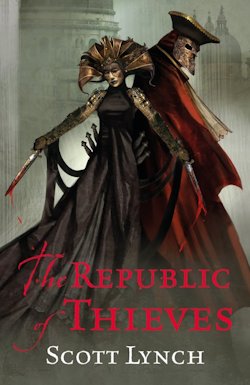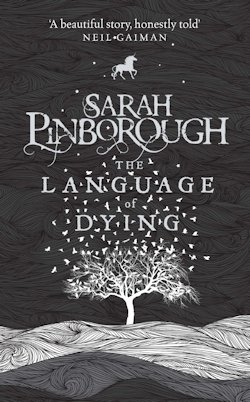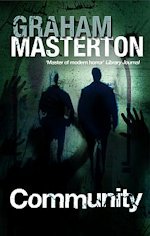Welcome back to the British Genre Fiction Focus, Tor.com’s weekly column dedicated to news and new releases from the United Kingdom’s thriving speculative fiction industry.
We begin this edition with another update from Iain Banks, in the course of discussing which I get distracted—as did the Scottish author—by the idea that The Culture novels he has published with an additional initial were in any way the moneymakers that supported his more mainstream endeavours.
After that, the long overdue release of The Republic of Thieves suddenly seems real, in large part because Scott Lynch has written an exciting blurb for the book. Later on, the year of Sarah Pinborough steps up another gear with a look at the cover art of The Language of Dying—the fifth new novel she’ll release in 2013—and finally, Britain’s biggest bookseller undergoes yet another restructure.
In addition, we look ahead to a neat week in new releases, in which a classic car tells a terrifying tale, the Expanse is embiggened, car-crash survivor Gregory Merrick can’t remember anything, and to top it all off, Walter Bishop takes a trip.
NEWS
The Culture Subsidy
For not a few filmmakers, it’s normal enough to produce or direct traditional Hollywood blockbusters for the big bucks with which they may pay the way for more personal efforts. For every Pan’s Labyrinth, Guillermo del Doro had to make a Mimic; to fund The Prestige, Christopher Nolan rebooted the Batman franchise; meanwhile, immediately after polishing off The Avengers, Joss Whedon engineered some Shakespeare; and so on.
But you don’t hear about that happening in genre fiction so frequently, do you?
This was an idea Iain Banks addressed in his latest update. The outpouring of love and respect he’s received since bravely telling the world he was on the way out appears to have continued, but with time so very short, he hasn’t been able to reply to every admirer individually. He has, however, spoken out about certain factual inaccuracies:
So far the only point I can remember is one where an ex-neighbour of ours recalled (in an otherwise entirely kind and welcome comment) me telling him, years ago, that my SF novels effectively subsidised the mainstream works. I think he’s just misremembered, as this has never been the case. Until the last few years or so, when the SF novels started to achieve something approaching parity in sales, the mainstream always out-sold the SF—on average, if my memory isn’t letting me down, by a ratio of about three or four to one. I think a lot of people have assumed that the SF was the trashy but high-selling stuff I had to churn out in order to keep a roof over my head while I wrote the important, serious, non-genre literary novels. Never been the case, and I can’t imagine that I’d have lied about this sort of thing, least of all as some sort of joke. The SF novels have always mattered deeply to me—The Culture series in particular—and while it might not be what people want to hear (academics especially), the mainstream subsidised the SF, not the other way round. And… rant over.
The very idea that The Culture novels would be the moneymakers in said scenario strikes me as strange. Because that’s not our opinion, is it? Those of us steeped in the business of the industry are well aware, I do declare, that genre fiction’s future is far from assured. That many of the best books produced by the cream of the crop of our authors are so overlooked that they aren’t even allotted shelf space.
But if this is also the mainstream perception, or at least the opinion of those with a particular penchant for literary fiction… if they, in their turn, believe that genre fiction tends to sell better than Richard and Judy’s favourite books, are we then to assume these readers bear the same sort of persecution complex typically attributed to speculative?
An interesting insight into how the other half thinks and lives—or thinks we live, in any event.
Getting back to Iain Banks, he also noted that he’s bought a Beamer, been to Barra, and written what are essentially fan letters several of his own favourite authors, including Alasdair Gray and our own M. John Harrison.
His new novel—very likely his final work of fiction—The Quarry, will be published within the coming month, and it is, according to the publisher, “a virtuoso performance whose soaring riffs on the inexhaustible marvel of human perception and rage against the dying of the light will stand among Iain Banks’ greatest work.”
Teasing The Republic of Thieves

In mid-March we heard that, at long last, The Republic of Thieves had a real release date.
Let me relieve your fears off the bat: I’m not here to tell you it’s been pushed back. In fact, the publication of this famously delayed book seems practically guaranteed to actually happen, not least because last week a blurb for the next novel in the saga of The Gentlemen Bastards was let loose.
You might be interested to know that the following synopsis was written by the author rather than some publicist—excepting the striking shoutline, which came via Gollancz’s Simon Spanton.
Without any further ado, here’s the titular tease:
Locke Lamora is dying…
Locke and Jean barely escaped with their lives from what should have been the greatest heist of their career, in the port city of Tal Verrar. Now they head north, looking for sanctuary and an alchemist who can cure the poison that is slowly killing Locke. They find neither, but with their luck, money and hope exhausted, they receive an offer from a power that has never had their best interests at heart: The Bondsmagi of Karthain.
In exchange for the chance that Locke might be saved, the Bondsmagi expect the two Gentlemen Bastards to rig an election in their home city of Karthain. They will be opposed. The other side has already hired the services of Sabetha Belacoros, the one person in the world who might match Locke’s criminal skill, and the one person in the world who absolutely rules his heart.
Now it will be con artist against con artist in an election that couldn’t be more crooked, all for the benefit of the mysterious Bondsmagi, who have plans within plans and secrets they’re not telling….
Incidentally, I read some original Scott Lynch very recently indeed: specifically a superb new story in Solaris’ star-studded new fantasy anthology, Fearsome Journeys, for review in a subsequent edition of the ongoing Short Fiction Spotlight.
I won’t keep you on tenterhooks, however. In case any of you were wondering—and after so long absent this author’s voice it’s no slight that you might—let me simply say that this guy’s still got it.
Roll on the release of The Republic of Thieves in early October!
Cover Art Corner: The Language of Dying
In my review of Mayhem, published here on Tor.com a little more than a month ago, I wrote that generations hence, 2013 could very well be revered as the year of Sarah Pinborough. For a very real reason, even, because—let’s face it—she’s been absolutely everywhere of late, and she shows no sign of slowing down.
Indeed, ostensibly ill content with the four new novels she was set to release this year, last week we heard that a fifth will issue from Pinborough’s pen before 2013 is good and through!

The Language of Dying sounds darker by far than any of the author’s other efforts, yet I remain keen to see it.
You should find some lovely, understated cover art to the right—right?—and the book’s bleak blurb below:
Tonight is a special, terrible night.
A woman sits at her father’s bedside watching the clock tick away the last hours of his life.
Her brothers and sisters—all broken, their bonds fragile—have been there for the past week, but now she is alone.
And that’s always when it comes.
The clock ticks, the darkness beckons.
If it comes at all.
The fine folks behind Jo Fletcher Books are planning to publish The Language of Dying in paperback this very December. Mark your calendars accordingly.
Waterstones Restructure
In the course of this column, we’ve talked about Waterstones often. In part because there is no more visible bookseller in Britain, but also because things seem to be changing there on a damn near daily basis. The past week, for example, brought news of yet another restructure, reportedly in order that the organisation can “put more emphasis on traditional shop floor bookselling.”
The Bookseller has the whole story:
Staff were told […] in an email communication from Waterstones managing director James Daunt that those holding the positions of branch manager, assistant manager, general manager and deputy manager will enter into a consultation before the company restructures and those roles are abolished. A new “bookshop manager” role will be created instead to encompass those positions, which will “call on different skills,” he said.
It is not clear how many members of staff will leave the company.

What is clear is that many of Waterstones’ employees will be affected by this latest shake-up.
And this on the back of I don’t know how many optimistic reports about the bookseller’s future….
Unless there’s some bad news on the cards, presumably to be broken when the time is deemed right, significantly altering the company’s infrastructure at this stage seems to me to go against good reason. I mean, if it ain’t broke, what do you think you’re fixing?
In answer, Daunt did allude to some of the problems facing Waterstones in the current climate:
Daunt apologised to those affected and recognised that the restructure came at a time when employees were working hard and sales were “robust” at the company. He said: “I would not be entering into this unless I thought it necessary, and unless I was sure that we will emerge a better, stronger bookseller for having done it… I am acutely aware that we do this at the very moment that we are doing well. Sales are robust, costs and operational process greatly improved and the net performance of Waterstones has made a step-change for the better. The substantial part of this improvement is down to your individual and collective effort.”
But, he added: “The context, however, is the current unforgiving bookselling environment. We may be running better bookshops, and running these in a very different manner to before, but we have yet to recognise this in our management structure. If we are to secure the future of Waterstones, we must take the difficult step to do so.”
Never mind whether or not this is a necessary evil… my heart still goes out to all the poor souls whose prospects said step will squash.
But cheer up! It’s time to look ahead to the week in new release.
NEW RELEASES

Fringe: The Zodiac Paradox (Fringe #1), by Christa Faust (May 30, Titan)
In 1974, University students Walter Bishop and William Bell test an exotic chemical compound, attempting to link their subconscious minds.
The result is beyond all expectations: a rip in space, opening the way between two universes.
Through the rift comes a menace unlike any our world has ever imagined, and it falls to Bishop, Bell, and their ally Nina Sharp to stop him.

NOS4R2, by Joe Hill (May 30, Gollancz)
Summer. Massachusetts.
An old Silver Wraith with a frightening history. A story about one serial killer and his lingering, unfinished business.
Anyone could be next.
We’re going to Christmasland….
NOS4R2 is an old-fashioned horror novel in the best sense. Claustrophobic, gripping and terrifying, this is a story that will have you on the edge of the seat while you read, and leaving the lights on while you sleep. With the horrific tale of Charles Manx and his Silver Wraith, Joe Hill has established himself as the premiere horror and supernatural thriller writer of his generation.

War God: Nights of the Witch, by Graham Hancock (May 30, Coronet)
A young girl called Tozi stands at the bottom of a pyramid, waiting to be led to the top where her heart will be cut out….
Pepillo, a Spanish orphan who serves a sadistic Dominican friar, is aboard the Spanish fleet as it sails towards Mexico….
This is the epic story of the clash of two empires, two armies and two gods of war. Five hundred desperate adventurers are about to pit themselves against the most brutal armies of the ancient Americas, armies hundreds of thousands strong.
This is a war of gods and men. Dark powers that work behind the scenes of history show their hand as the prophecy of the return of Quetzalcoatl is fulfilled with the arrival of Cortes. The Aztec ruler Moctezuma fights to maintain the demands of the war god Huitzilopochtli for human sacrifice. The Spanish Inquisition is planning an even greater blood-letting.
Caught up in the headlong collision between two gods of war are Tozi, Pepillo and the beautiful sex slave Malinal whose hatred of Moctezuma runs so deep she will sell out her own land and people to destroy him.

Community, by Graham Masterton (May 31, Severn House)
Tasha and Michael are driving back home to San Fransisco when a pick-up rams their car, forcing them off the road. The car spins, and Tasha hits her head. Michael, terrified that Tasha is dead, tries to free them from the wreckage, but before he can do so, he’s blinded by the light of an oncoming vehicle….
He wakes to find himself in the hospital of a small town in the foothills of the Cascade Mountains. What is he doing there? Who is he? He can’t even remember his own name—Gregory Merrick, according to the doctor. As he convalesces, he becomes acquainted with the community and forms a relationship with a smart, pretty local girl.
But as he recovers his mobility, he begins to notice odd things happening. People disappearing. Strangers being ignored by the locals, as if they weren’t even there. Then his new girlfriend vanishes, and he begins to think the unthinkable: could he actually be dead?
The truth, however, is far more shocking….

Deadbeat: Makes You Stronger, by Guy Adams (May 31, Titan)
Max and Tom are old, old friends who used to be actors. Tom now owns a jazz nightclub called Deadbeat which, as well as being their source of income, is also something of an in-joke.
In a churchyard one night they see men loading a coffin into the back of a van. But why take a full coffin away from a graveyard and, more importantly, why is the occupant still breathing?
Tom and Max are on the case.

Abaddon’s Gate (Expanse #3), by James S. A. Corey (June 4, Orbit)
For generations, the solar system—Mars, the Moon, the Asteroid Belt—was humanity’s great frontier. Until now. The alien artefact working through its program under the clouds of Venus has emerged to build a massive structure outside the orbit of Uranus: a gate that leads into a starless dark.
Jim Holden and the crew of the Rocinante are part of a vast flotilla of scientific and military ships going out to examine the artefact. But behind the scenes, a complex plot is unfolding, with the destruction of Holden at its core. As the emissaries of the human race try to find whether the gate is an opportunity or a threat, the greatest danger is the one they brought with them.
POSTSCRIPT
I’ve already blown through Abaddon’s Gate and NOS4R2 for review, otherwise both of these would be required reading for me. So what will I have my nose buried in this week?
Well, I’m not usually one to go in for tie-in fiction, but this new Fringe novel—the first of three to be published this year, I see—really does appeal to me. It’s been quite a while, but I remember Christa Faust being awesome; plus, Walter Bishop tripping. What’s not to want?
Community sounds pretty interesting as well, but I’ve yet to lay eyes on a copy, so we’ll have to wait and see what the deal is with this Gregory Merrick fellow….
And that’s it for this week’s edition of the British Genre Fiction Focus! As ever, I invite you to continue the conversation in the comments, and don’t forget to check in again next Wednesday for another round-up of news and new releases.
Niall Alexander is an erstwhile English teacher who reads and writes about all things weird and wonderful for The Speculative Scotsman, Strange Horizons, and Tor.com, where he contributes a weekly column concerned with news and new releases in the UK called the British Genre Fiction Focus, and co-curates the Short Fiction Spotlight. On occasion he’s been seen to tweet, twoo.










